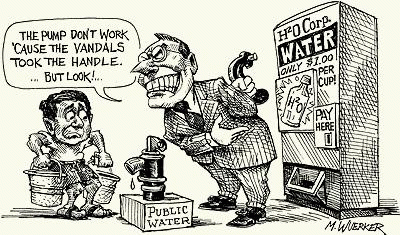The President of the United Nations General Assembly has told delegates at the 5th World Water Forum (WWF) in Istanbul, Turkey, that, "those who are committed to the privatization of water, making it a commodity like oil, are denying people a human right as basic as the air we breathe."
In a speech delivered by his senior advisor on water Maude Barlow, UN president Miguel d'Escoto Brockmann said, "We must work quickly to guarantee that access to drinking water constitutes a fundamental right of all peoples..."
"Water belongs to the people, to the ecosystem and the species and it belongs to the future" had said Maude Barlow earlier this week in Istanbul.
Ms Barlow, who is also the national chairperson of the Council of Canadians, delivered the president's message to the People's Water Forum, a counter-forum being held by hundreds of civil society members from nearly 70 countries whose voices have not been at the WWF. The speech was later released to the World Water Forum, which is being attended by 20,000 delegates from 150 countries.
The UN president also questioned the legitimacy of the forum itself. His speech stated, "The forum's orientation is profoundly influenced by private water companies. This is evident by the fact that both the president of the World Water Council and the alternate president are deeply involved with provision of private, for-profit, water services."
He added that future forums should, "conduct their deliberations under the auspices of the United Nations."
D'Escoto Brockmann also criticized the World Water Forum's draft Ministerial Declaration, which sees water as a "human need" rather than a human right. He said, "As it stands, this important statement undermines the efforts of those who are struggling for access to clean water and sanitation."
"Global water justice movement advocates welcome this being the last World Water Forum in its present format," adds Barlow. "There is an urgent need for an accountable and legitimate global water forum to be held regularly to address the grave threats facing our blue planet."
Earlier last week, a group of 118 organizations from 33 countries had signed and issued a letter to United Nations Secretary General Ban Ki-Moon that calls on him to withdraw his support for the 'CEO Water Mandate', a corporate driven water initiative under the 'UN Global Compact' that facilitates corporate control of water resources. Representatives of the letter's signatories had delivered a copy of the letter to the Deputy Director of the UN Global Compact, Gavin Power at the 5th World Water Forum.
The CEO Water Mandate's leading endorsers currently include water bottlers Coca-Cola, Nestlé, and Pepsi, as well as Suez, one of the world's largest privatizers of water services and systems.
"All of these corporations have a vested interest in controlling water resources and profiting from water scarcity, so there is a great danger in leaving international water policy in such hands," said Richard Girard, researcher for the Polaris Institute.
"Those who are dealing with corporate control of water's manifold downsides – water takings, water shut-offs, price hikes, short cuts on water treatment – are people deeply affected by the water crisis and corporations' actions," said Mark Hays from Corporate Accountability International. "Yet these same people, who are going thirsty, don't have a true voice at these meetings – their voices need to be heard, and they should be in the drivers' seat."
The Global Water Justice Movement activists are calling on the United Nations to take the lead in creating transparent, democratic space to decide international water policy. But to date, the UN continues to be in a contradictory position by, on the one hand, raising awareness about the world water crisis and calling for needed change, and on the other housing the CEO Water Mandate. Groups like the Polaris Institute and Corporate Accountability International are challenging the CEO Mandate because it allows corporations to undermine democratic control of water under the aegis of the United Nations.

Privatising Water is Denying People a Human Right: UN |
|
|
Rate It | View Ratings |
Bobby Ramakant is a development journalist and has been writing on development issues since 1991. Health is one of the key focus areas he writes on. He is also a World Health Organization (WHO)'s WNTD awardee for 2008
The views expressed herein are the sole responsibility of the author
and do not necessarily reflect those of this website or its editors.

OpEdNews depends upon can't survive without your help.
If you value this article and the work of OpEdNews, please either Donate or Purchase a premium membership.
STAY IN THE KNOW
If you've enjoyed this, sign up for our daily or weekly newsletter to get lots of great progressive content.
If you've enjoyed this, sign up for our daily or weekly newsletter to get lots of great progressive content.
Most Popular Articles by this Author: (View All Most Popular Articles by this Author)
Privatising Water is Denying People a Human Right: UN
Corporate Water Forum Spurs Mass Protest
To View Comments or Join the Conversation:



